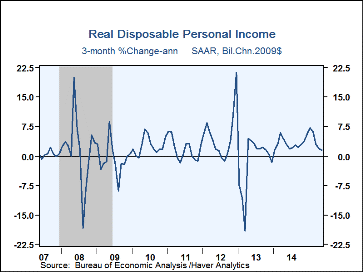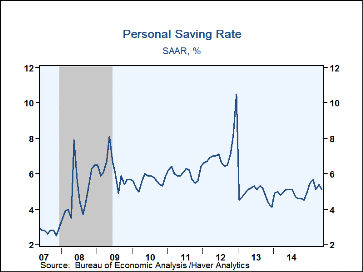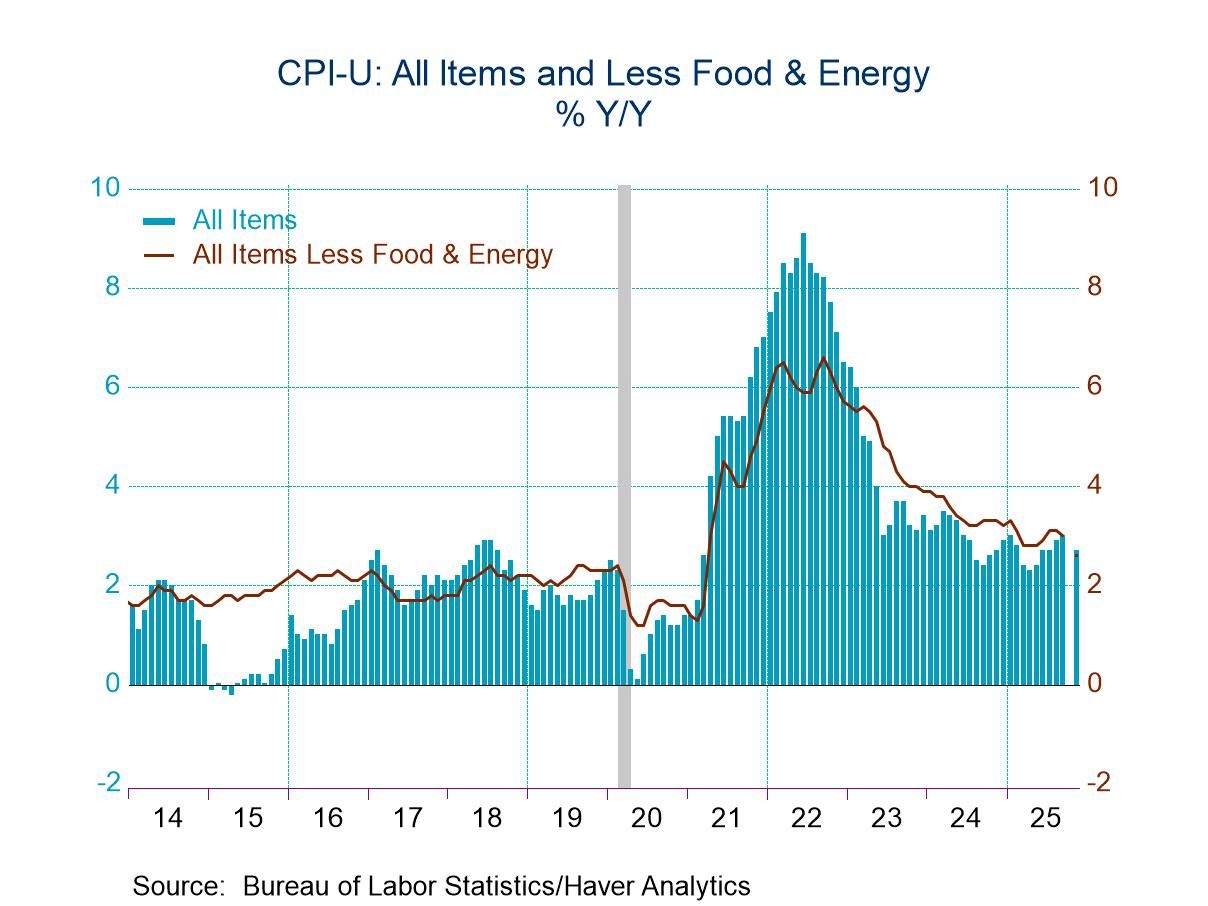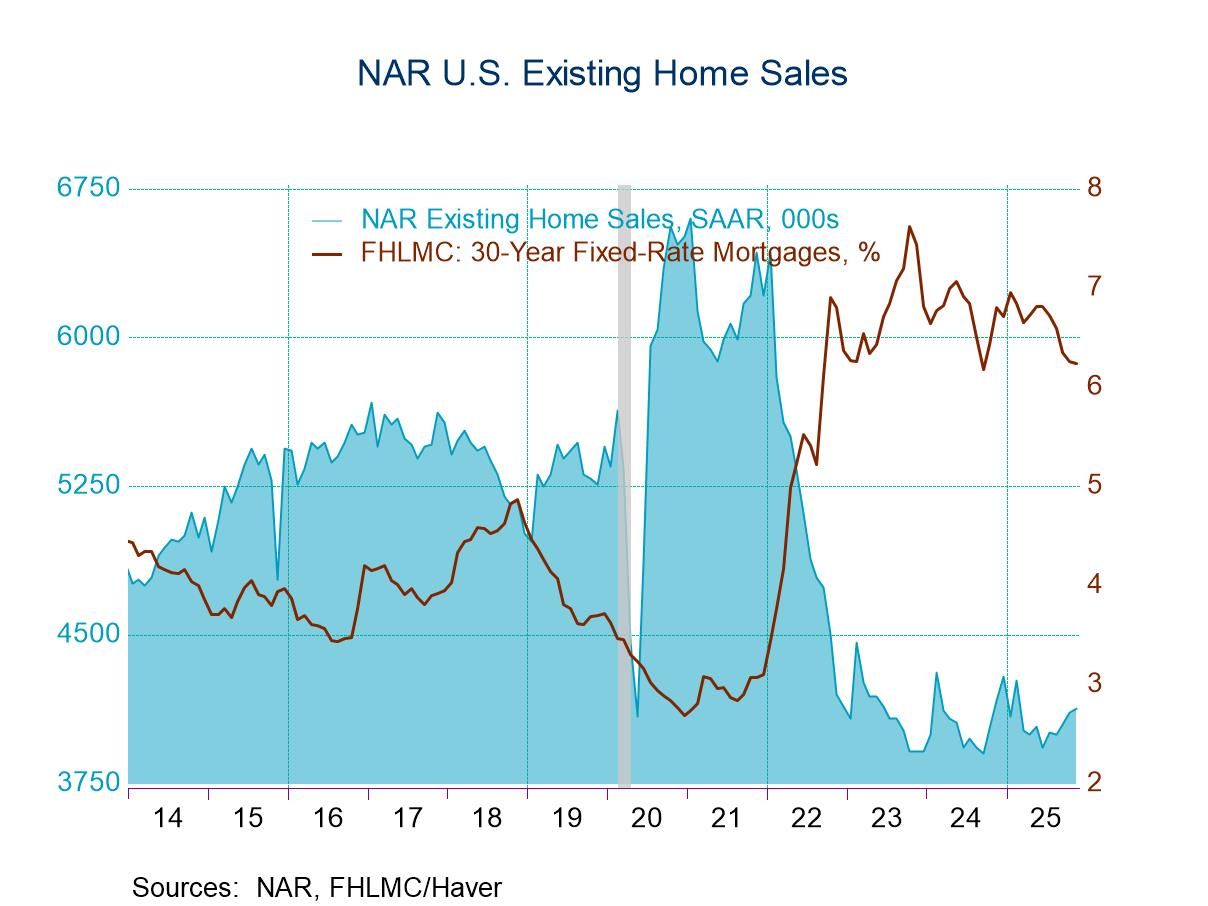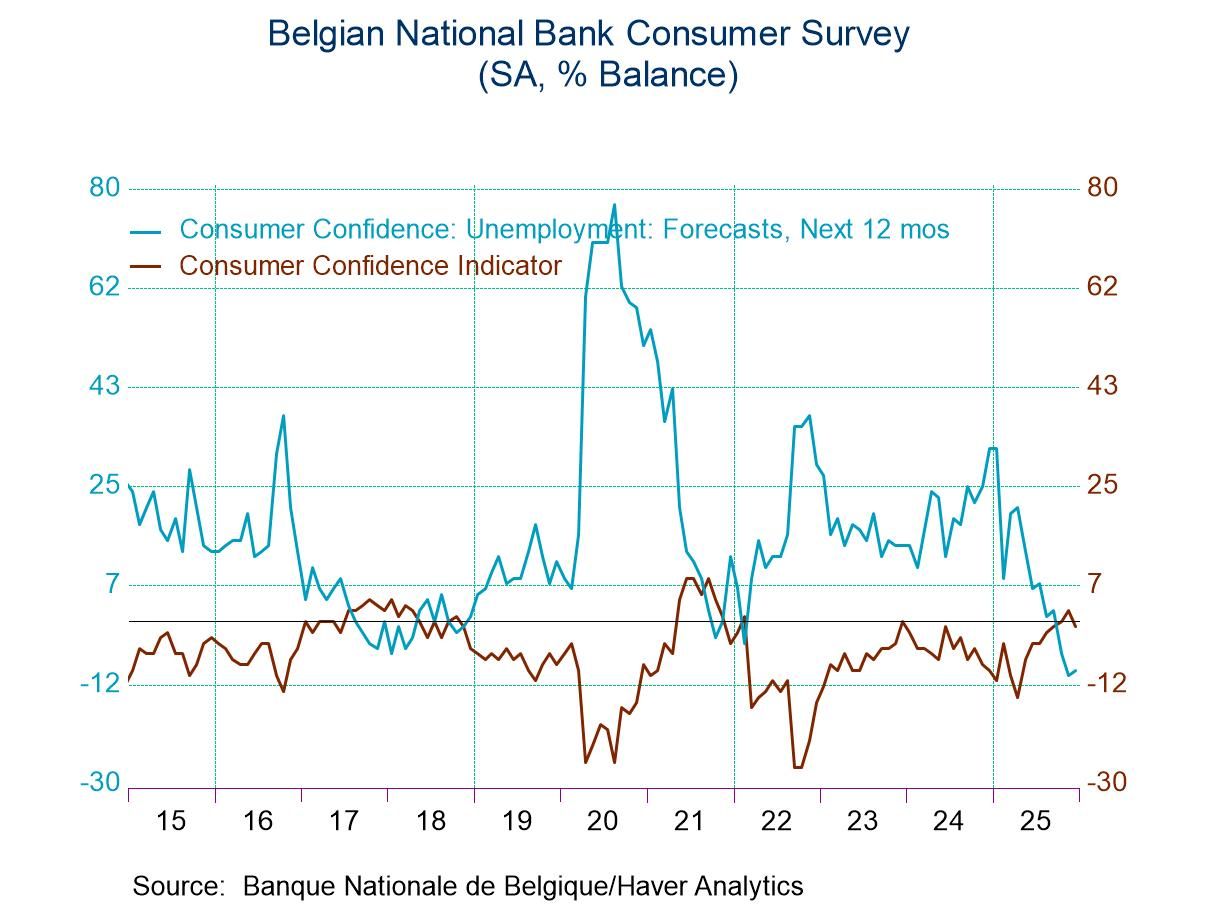 Global| Jun 25 2015
Global| Jun 25 2015U.S. Personal Spending Strength Is Bolstered by Firm Income Growth
by:Tom Moeller
|in:Economy in Brief
Summary
Consumers are spending what they earn. Personal consumption expenditures jumped 0.9% during May following a 0.1% uptick in April, revised from a negligible decline. It was the largest monthly increase since August 2009 and beat [...]
Consumers are spending what they earn. Personal consumption expenditures jumped 0.9% during May following a 0.1% uptick in April, revised from a negligible decline. It was the largest monthly increase since August 2009 and beat expectations for a 0.7% rise in the Action Economics Forecast Survey. Adjusted for price inflation, personal spending improved 0.6%, the biggest monthly gain since last August. Real durable goods purchases jumped 2.3% (7.5% y/y), driven by a 2.3% advance (7.5% y/y) in spending on motor vehicles, following a 0.1% slip. Real furniture & appliance buying also rebounded 1.5% (6.7% y/y) after a 0.4% easing. Nondurable goods purchases in constant dollars improved 0.9% (3.2% y/y). Spending on gasoline recouped April's decline with a 3.8% jump (5.3% y/y). Real clothing purchases increased 1.8% (4.3% y/y) following declines in three of the prior four months. Services spending improved 0.2% in constant dollars (2.8% y/y). The rise was led by a 0.8% jump in spending on recreation (1.8% y/y) which followed a 1.3% gain.
Personal income matched expectations and improved 0.5% (4.4% y/y) for the second straight month. Wages & salaries also rose 0.5% (5.0% y/y), the strongest gain in three months. Rental income rose 0.8% (6.7% y/y) following a 0.7% April jump and proprietors income improved 0.8% (1.9% y/y), making up for weakness earlier in the year. Social security payments rose 0.5% (4.7% y/y) after a 0.3% rise while Medicare receipts gained 0.4% (3.4% y/y) following a 1.1% jump. To the downside, Medicaid payments declined 0.7% (+8.3% y/y) after a 0.5% easing and unemployment insurance receipts declined 1.9% (-14.5% y/y), off 6.7% this year.
Disposable income increased 0.5% (3.8% y/y) after a 0.4% rise. In real terms, disposable income gained 0.2% (3.5% y/y) after a 0.4% advance. The three-month rate of change deteriorated, however, to 1.6%, its lowest since early last year.
Last month's strength in spending outpaced the rise in income, thus reducing the personal savings rate to 5.1% which equaled this year's low point. Nevertheless, it's been trending higher since the 4.1% low in December of 2013. Personal saving rose a lessened 3.8% during the last twelve months.
The chain price index gained 0.3% (0.2% y/y) following no change during April. Energy prices jumped 4.7% (-16.8% y/y) while food prices eased 0.1% (+0.7% y/y). Durable goods prices eased 0.1% (-1.9% y/y) but nondurable goods prices jumped 1.0% (-3.0% y/y) with a 9.1% spurt (-23.8% y/y) in gasoline costs. Services prices improved 0.2% (1.7% y/y). The price index excluding food & energy edged 0.1% higher (1.2% y/y) for a second month.
The personal income & consumption figures are available in Haver's USECON database with detail in the USNA database. The consensus expectation figures are in the AS1REPNA database.
| Personal Income & Outlays (%) | May | Apr | Mar | Y/Y | 2014 | 2013 | 2012 |
|---|---|---|---|---|---|---|---|
| Personal Income | 0.5 | 0.5 | 0.0 | 4.4 | 4.0 | 2.0 | 5.2 |
| Wages & Salaries | 0.5 | 0.3 | 0.1 | 5.0 | 4.6 | 2.8 | 4.5 |
| Disposable Personal Income | 0.5 | 0.4 | 0.0 | 3.8 | 3.9 | 1.0 | 4.9 |
| Personal Consumption Expenditures | 0.9 | 0.1 | 0.6 | 3.6 | 3.9 | 3.6 | 3.7 |
| Personal Saving Rate | 5.1 | 5.4 | 5.1 | 5.1 (May '14) |
4.9 | 4.9 | 7.2 |
| PCE Chain Price Index | 0.3 | 0.0 | 0.2 | 0.2 | 1.3 | 1.2 | 1.8 |
| Less Food & Energy | 0.1 | 0.1 | 0.2 | 1.2 | 1.4 | 1.3 | 1.8 |
| Real Disposable Income | 0.2 | 0.4 | -0.2 | 3.5 | 2.5 | -0.2 | 3.0 |
| Real Personal Consumption Expenditures | 0.6 | 0.0 | 0.5 | 3.4 | 2.5 | 2.4 | 1.8 |
Tom Moeller
AuthorMore in Author Profile »Prior to joining Haver Analytics in 2000, Mr. Moeller worked as the Economist at Chancellor Capital Management from 1985 to 1999. There, he developed comprehensive economic forecasts and interpreted economic data for equity and fixed income portfolio managers. Also at Chancellor, Mr. Moeller worked as an equity analyst and was responsible for researching and rating companies in the economically sensitive automobile and housing industries for investment in Chancellor’s equity portfolio. Prior to joining Chancellor, Mr. Moeller was an Economist at Citibank from 1979 to 1984. He also analyzed pricing behavior in the metals industry for the Council on Wage and Price Stability in Washington, D.C. In 1999, Mr. Moeller received the award for most accurate forecast from the Forecasters' Club of New York. From 1990 to 1992 he was President of the New York Association for Business Economists. Mr. Moeller earned an M.B.A. in Finance from Fordham University, where he graduated in 1987. He holds a Bachelor of Arts in Economics from George Washington University.



